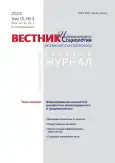High-ranking officials of the plenipotentiary representative offices of the President of the Russian Federation in the federal districts: recruitment channels and careers
- 作者: Tev D.B.1
-
隶属关系:
- Sociological Institute of FCTAS RAS
- 期: 卷 15, 编号 3 (2024)
- 页面: 210-232
- 栏目: Life Path and Career Trajectories of Russians
- URL: https://journal-vniispk.ru/2221-1616/article/view/270241
- DOI: https://doi.org/10.19181/vis.2024.15.3.12
- EDN: https://elibrary.ru/ZORQIH
- ID: 270241
如何引用文章
全文:
详细
The article covers the analysis of the main recruitment channels for high-ranking officials of the plenipotentiary representative offices of the President of the Russian Federation in the federal districts. As the empirical basis of the study serves the biographical database, that includes information on 154 presidential bureaucrats as of April 2023. Recruitment of people from various socio-professional groups to the apparatus of the plenipotentiary representative offices reveals a number of trends caused by interacting push (specific features of the candidate's position and associated resources and interests) and pull (place in the power system and functional specialisation of the plenipotentiary representative offices, specifics of leadership positions in them, as elements of the opportunity structure, as well as personal connections) factors. One of the most important trends is militarisation: most officials of the plenipotentiary representative offices have work experience in law enforcement agencies and even spent there most of their previous careers. Recruiting security officials who are, in terms of career, “ideal-typical” federal officials and professionally socialised within the framework of rigid, centralised hierarchies probably strengthens the autonomy of the plenipotentiary representations from actors and interests external to federal power, including regional administrations, that these bodies are called upon to control. The logic of autonomisation is also in line with the fact that one of the main suppliers (especially direct) of key officials of the plenipotentiary representations is the Presidential Administration, first of all, the apparatus of the representations themselves. However, a significant minority of presidential officials have experience working in regional administrations (especially among deputies and assistants to plenipotentiaries), as well as in business, both public and private (especially among plenipotentiaries and their deputies). At the same time positions in these structures rarely serve as a direct springboard to a key position in the plenipotentiary representations. Finally, the role of legislative bodies as a channel for recruiting presidential officials is insignificant. In general, the author's findings are consistent with the results of previous studies, indicating the relative stability of recruitment trends.
作者简介
Denis Tev
Sociological Institute of FCTAS RAS
Email: denis_tev@mail.ru
ORCID iD: 0000-0001-5442-7585
SPIN 代码: 6278-5841
Researcher ID: N-5461-2017
Candidate of Sociological, Senior Researcher of the Department of sociology of power and civil society St. Petersburg, Russia
参考
- Гимпельсон В. Е., Магун В. С. На службе государства российского: перспективы и ограничения карьеры молодых чиновников // Вестник общественного мнения. Данные. Анализ. Дискуссии. 2004. № 5(73). С. 19–36. EDN: HTLRNR.
- Лебедев В. А. Становление и развитие института полномочного представителя президента Российской Федерации в федеральном округе // Вестник Ун-та им. О. Е. Кутафина (МГЮА). 2018. № 6. С. 88–96. doi: 10.17803/2311-5998.2018.46.6.088-096; EDN: XVBPXF.
- Меженина О. В., Полуэктова Н. Н. Полномочные представители президента в федеральных округах РФ: социально-профессиональные аспекты (2000–2014 гг.) // Известия Алтайского госун-та. 2014. № 4-2(84). С. 289–294. doi: 10.14258/izvasu(2014)4.2-43; EDN: RKCGQJ.
- Тев Д. Б. Высокопоставленные чиновники Администрации Президента РФ: каналы рекрутирования и карьера // Журнал социологии и социальной антропологии. 2020. Т. 23. № 3. С. 153–187.doi: 10.31119/jssa.2020.23.3.7; EDN: LOLGQW.
- Федеральная реформа 2000–2003. Т. 1. Федеральные округа / Под ред. Н. Петрова. Сер. «Библиотека местного самоуправления». Вып. 48(1). М.: МОНФ, 2003. 512 с.
- Хантингтон С. Политический порядок в меняющихся обществах / Пер. с англ. В. Р. Рокитянского. М.: Прогресс-Традиция, 2004. 579 с. EDN: QODDDF.
- Borchert J. Individual Ambition and Institutional Opportunity: A Conceptual Approach to Political Careers in Multi-level Systems // Regional & Federal Studies. 2011. Vol. 21(2). P. 117–140. doi: 10.1080/13597566.2011.529757.
- Burkhardt F. Institutionalising authoritarian presidencies: Polymorphous power and Russia’s Presidential Administration // Europe-Asia Studies. 2021. Vol. 73(3). P. 472–504.doi: 10.1080/09668136.2020.1749566.
- Burkhardt F., Libman A. The Tail Wagging the Dog? Top-down and Bottom-up Explanations for Bureaucratic Appointments in Authoritarian Regimes // Russian Politics. 2018. Vol. 3(3). P. 239–59. doi: 10.1163/2451-8921-00302005
- Chebankova E. A. The Limitations of Central Authority in the Regions and the Implications for the Evolution of Russia's Federal System // Europe-Asia Studies. 2005. Vol. 57(7). P. 933–949. doi: 10.1080/09668130500301329.
- Dreher A., Lamla M. J. et al. The Impact of Political Leaders’ Profession and Education on Reforms // Journal of Comparative Economics. 2009. Vol. 37(1). P. 169–193. doi: 10.1016/j.jce.2008.08.005.
- Harasymiw B. Mosca and Moscow: Elite Recruitment in the Soviet Union // Czudnowski M. M. (ed.) Does Who Governs Matter? Elite Circulation in Contemporary Societies. Chicago: North Illinois University Press, 1981. P. 265–292.
- Horowitz M., Stam A. Does Where You Stand Depend On If You Served? How Military Backgrounds Influence the Behavior of Leaders. Paper written for presentation at the American Political Science Association Annual Meeting. 2010. 35 p. URL: https://www.researchgate.net/publication/228160133_Does_Where_You_ Stand_Depend_On_If_You_Served_How_Military_Backgrounds_Influence_The_ Behavior_Of_Leaders (дата обращения: 09.09.2022).
- Jochimsen B., Thomasius S. The perfect finance minister: whom to appoint as finance minister to balance the budget // European Journal of Political Economy. 2014. Vol. 34(C). P. 390–408. doi: 10.1016/j.ejpoleco.2013.11.002.
- Petrov N. Siloviki in Russian Regions: New Dogs, Old Tricks // The Journal of Power Institution in Post-Soviet Societies. 2005. Vol. 2. URL https://journals.openedition.org/pipss/331 (дата обращения: 17.06.2023). doi: 10.4000/pipss.331.
- Ross C. Putin’s federal reforms and the consolidation of federalism in Russia: one step forward, two steps back! // Communist and Post-Communist Studies. 2003. Vol. 36(1). P. 29–47. doi: 10.1016/S0967-067X(02)00057-0.
- Scharfenkamp K. It’s About Connections – How the Economic Network of the German Federal Government Affects the Top Earners’ Average Income Tax Rate // Jahrbücher für Nationalökonomie und Statistik. 2016. Vol. 236(4). P. 427–453.
- Semenova E. Russia: cabinet formation and careers in a super-presidential system // Dowding K., Dumont P. (eds) The Selection of Ministers around the World. L.; N. Y.: Routledge, 2015. P. 139–155. doi: 10.4324/9781315757865.
补充文件









